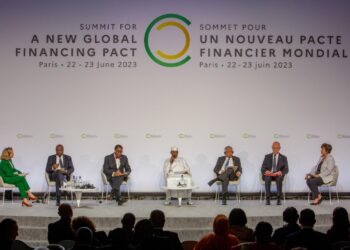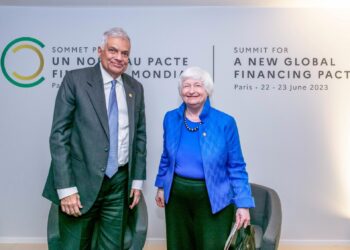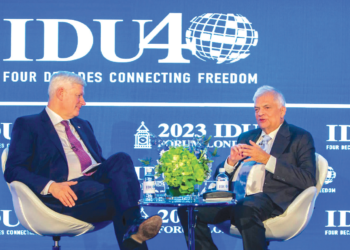June 2023 turned out to be a game of thrones in sports. Earlier in June, the Manchester City Football Club became the second English football club to win all three major tournaments in one season, the grand slams of soccer – the treble honors. Elsewhere on the clay courts of Roland Garros, Novak Djokovic won the French Open, his 23rd men’s singles grand slam victory, making him the men’s sole grand slam record holder. Amid high expectations, Djokovic pulled off a record-making win in Paris, demonstrating his years of training in on-court resilience and planning. That evening in Paris, he showed his ability to adapt and his motivation to achieve his goal of winning.
By Jennifer Paldano Goonewardane.
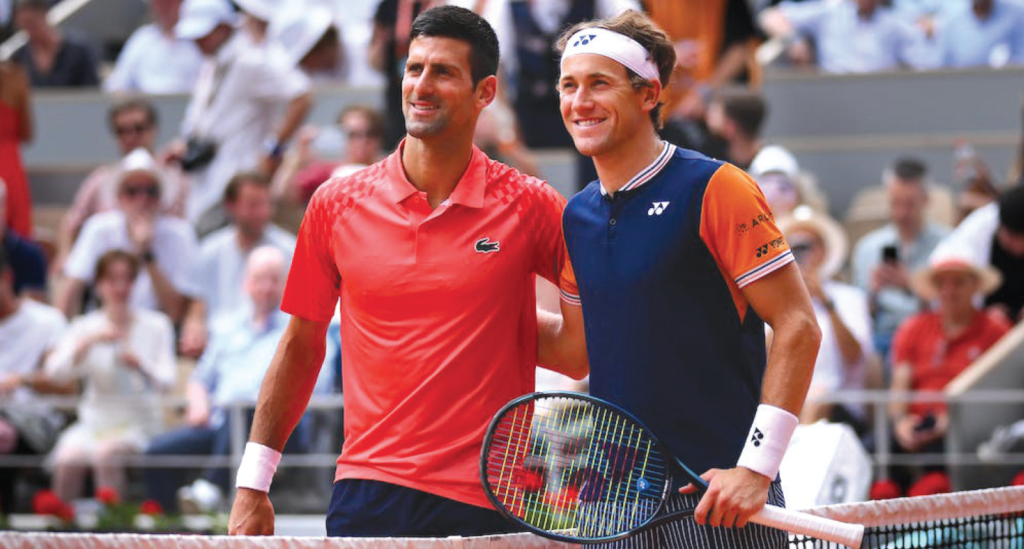
Novak Djokovic and Casper Ruud.
An Ambitious Hard Fought Journey
As a seven-year-old fledgling tennis player, Novak Djokovic had dreamt of greatness. He had dreamt of winning Wimbledon someday and becoming world number one in tennis. From then on, he had his eyes on the prize, and every victory as a professional sportsman came with meticulous planning, hard work, and, more than anything, a single-minded focus on winning. Of course, in all of this, a degree of natural talent counts too. On the evening of 11 June, the look of triumph on Novak Djokovic was unmistakable. It was yet another milestone on the road to tennis greatness. Watching Novak raise his victory cup to a captivating crowd cheer was certainly a goosebumps moment with the realization that he had just made tennis history. At that point, the commentator echoed what many were thinking. He seemed unbeatable and unstoppable, that air of confidence not eluding him for a moment. He displayed a levelheadedness that hid the punishing preparation for the game that catapulted him to tennis stardom. Is any pro tennis player not dreaming of winning at least one grand slam in their professional career? By winning it 23 times, Novak has emerged as the greatest-ever tennis player in history, setting a record that seems hard to break.
Winning his 23rd record-making grand slam and surpassing Rafael Nadal was extra special for Djokovic. Playing and winning the French Open has always been the hardest, which he admitted made the victory surreal and emotional. He applauded the spectators for their energy that brought out a good game on a historic day.
When he spoke to the arena that day, he said he enjoyed playing the match to an enthusiastic audience. But many other things stood out from his speech. Djokovic fought his French Open final rival, Casper Ruud, with a vengeance, until the last drop of sweat, as it were. However, on the podium, he spoke warmly of a person he described as the best personality on the tour whom fellow players, coaches, and organizers liked. To praise his rival’s personal qualities and his sporting skills is something new in post-victory speeches, demonstrating Djokovic’s pursuit of the correct human values even when extreme on-court rivalry is involved. Ruud, his family, parents, coaches, and the entire team had been incredibly gracious to Djokovic, deserving mention by the world number one. Their conduct had made a remarkable imprint in the world number one that he would dare focus the spotlight on his opponent as millions watched his victory speech. Whether anyone else would go to such an extent to appreciate the human qualities of one’s opponent and their teams is arguable, but for Novak, the humanist, to speak so fondly of Ruud and his team shows that gentlemanly conduct is a matter of choice while still playing tennis like a blood sport. Ruud accepted Djokovic’s praise with the highest modesty. That day at Roland Garros, both men showed skill and character.
Djokovic acknowledged the achievements of Yannick Noah, who had won the French Open 40 years ago, and presented the trophy to the champion, appreciating him as a champion and his post-tennis career choices in music and charity that brought positivity to people’s lives.
Upon winning in Paris, Novak thanked his team, admitting how hard the journey was, his relentless pursuit to win, a journey marked by trials and tribulations, as the tennis star described in his speech. Djokovic admitted to being pushy and demanding. The best testament to the fact that a good tennis player will capitalize on the resources available is Novak Djokovic. His thirst for victory and drive for distinction pushed his team to mold him into a winning whole. They believed in him and supported his pursuit.
Driving for Excellence
Going into the French Open, Djokovic says his focus was on preparing for the match in the best way possible to win like any other match, although he knew it was a history-making match. His focus was relentless, not on trying to set a new world record in tennis. Winning was his ultimate goal. For that, he ensured that the focus was solely on the fundamentals. Djokovic describes how he “tortured” his team during the tournament, the unseen drama, and the outbursts behind closed doors in a quest for excellence because grand slams motivate and drive him. As his coach Goran Ivanisevic has said, Djokovic has a winning mindset, a hunger that motivates him to win and to “switch his software” upon arrival. However, Novak hasn’t shied away from admitting the hardness of losing a match, admitting to feeling deflated, yet willing to bounce back from advice, correcting mistakes, adapting, and continuously learning. The leader of the pack that he was, Novak’s focus on excellence and striving toward that ideal kept his team on their feet, working with him and driving him toward the desired standard.
As Djokovic took away the victory cup, his focus and determination came out as solid as steel. His personality shone through as a strong, resilient fighter returning to the court to take on his opponent more robustly and determinedly. His camaraderie with fans, young ball pickers, and other on-court assistants demonstrates the simplicity of character. Despite being misjudged by pundits and fans, and despite certain controversies, Djokovic has shown great character on and off the court. He can be an excellent tennis star and a friend to a fan or an outspoken activist who believes in having his voice heard.
Focus Under Pressure
Quite the on-court dramatist, not failing to amuse the young ball pickers, assistants, and the audiences, Djokovic is the epitome of performance under pressure, the payoff for focusing on mind and body wellness training. He plays to a packed audience who watch his every move, whose eyes move from one end to the other. He has to endure their cheers, gasps, and sighs, feel the pressure of the situation, and still play confidently. Playing professional tennis for 20 years with rivals like Federer, Nadal, and Murray has made Djokovic the tough player who feels galvanized by the pressure such an encounter brings and diverts it to focus on the game, allowing him to perform at his best.
The extreme competition also defined Djokovic as a resilient player, and he has Nadal, Federer, and Murray to thank, who, his greatest on-court rivals, helped him learn and overcome his weaknesses. Constantly sharing lessons that he learned in his quest to become one of the top tennis players in the world, Djokovic would share his mental struggles and his determination to resolve them through therapeutic interventions. He has focused so much on his mental well-being, just as much as his physical fitness, that part of mental training has helped him integrate mindfulness. This cognitive skill allows him to be aware of the present, what he is doing, and what is happening, and be able to handle a mistake. It is the ability to synchronize one’s thoughts with the physical activity. That skill has helped him develop the resilience to bounce back faster from adversity. Resilience may sound like an overused term today, but mastering it matters a lot for players like Djokovic to have control over emotions. Analysts are praising Djokovic’s fitness. Physically Djokovic is at his peak, demonstrating immense flexibility and precision combined with a lightning reaction with which he dominates the court.
Djokovic’s Battle Spirit
As Djokovic won at the French Open, many wondered what he would do next. Will he hang the racquet now that he has accomplished his mission? Not so. As Djokovic explained after winning, his journey is still not over. He argued why he should end his career when he can still win slams in a two-decades-long career. He still feels motivated and inspired to play the best tennis at the grand slams because, according to him, grand slams make tennis history, and if so, why put shutters up when the going is good?
There is a duality to Djokovic’s personality that makes him a winner. Experts will speak of his serves, returns, and strokes in tennis jargon. Complementing his skill and fitness, which peaked when he entered the French Open, is mental strength. Influenced by challenging circumstances in his home country Serbia, despite which he went through grueling training, Djokovic shows steely mental strength, which helps him defend, fight, and bounce back after a setback – mindfulness putting him back on track. Mental strength helps him face the extreme pressure of the game and the highs and the lows. Those who analyze his personality contend that despite torturing himself to reach the standard he envisages for himself, at the top of his sport, he enjoys playing and harmonizes his physical agility with his mental strength. With physical fitness and mental strength under his belt, Djokovic looks set to play consistently and confidently in the future with a perennial attitude that pundits describe as lethal.
In playing world-class tennis, Djokovic wants to use his enormous platform to inspire young people and be a role model, including to his children, so that they learn something positive to help their futures. After his win, the world number one told young people they have the power to create their destiny. As a s even-year-old who dreamt of conquering Wimbledon, he believed that he had the power to be the master of his destiny, not only visualize but believe in himself to chase and achieve his dream. He told them to forget the past and be in the present, take the means available to make the end, believe in themselves, and create a better future. And Djokovic is continuing to make his future matter, ready to play till he drops as he plans for the 2023 Wimbledon Championships.
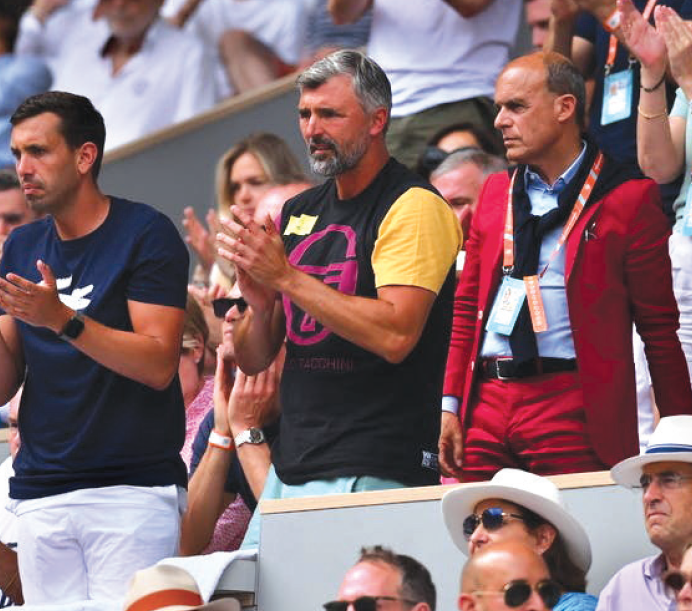
Coach Goran Ivanisevic and team.
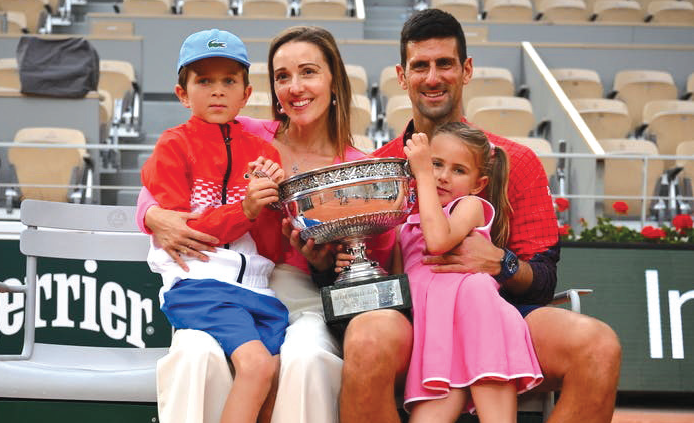
Novak Djokovic with wife Jelena Djokovic, son Stefan and daughter Tara.


